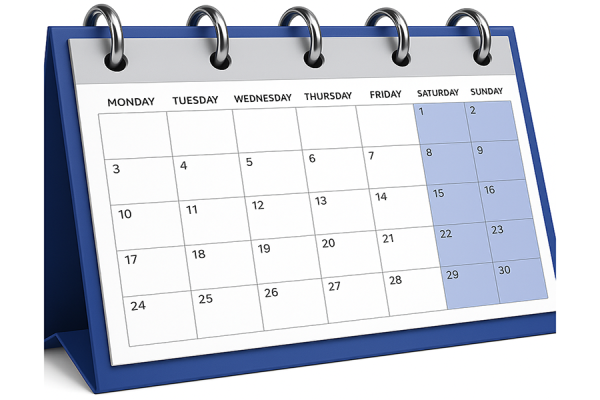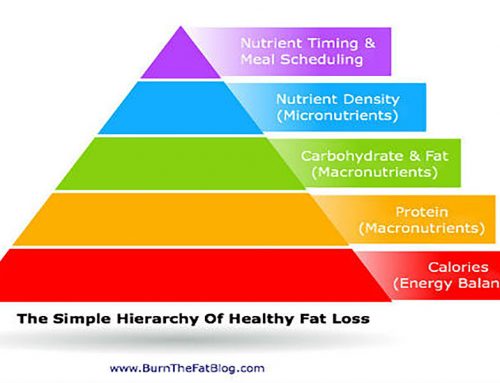5 days of perfect nutrition and training during the week can get wiped out by 2 days of indulgence on the weekend. In fact, it’s possible that even 1 day of weekend excess can set you back far enough that your net weekly results are a wash. Trainers get frustrated when the work they do with their clients all week long in the gym gets erased between Friday night and Monday Morning. As they say, “You can’t out-train a bad diet.” Today, however, it’s not just trainers who believe that 5 minus 2 equals 0. Scientists have also confirmed it.

A classic study at the Washington University School of Medicine was designed with a simple and clear objective: To determine whether changes in diet or activity patterns during weekends contribute to weight gain. The researchers also wanted to know whether any gain was primarily due to changes in diet or if physical activity patterns also played a role.
Prior to this study, the best evidence for suspecting that changes in weekend eating were contributing to weight gain or difficulty losing weight came from the National Weight control Registry (NWCR).
NWCR participants who reported greater dieting consistency (i.e. maintaining the same nutritional pattern on weekends as on weekdays) were more likely to maintain their weight during the subsequent year, while participants with lower dieting consistency were more likely to regain the weight during the subsequent year.
To test this hypothesis, a randomized, controlled trial one year in length was designed, including 48 healthy adult subjects. The trial was part of the National institutes of Health CALERIE study (Comprehensive Assessment of Long-term Effects of Reducing Intake of Energy).
Daily weight changes were calculated for weekends (Friday to Monday) and weekdays (Monday to Friday). Daily energy intakes and expenditures were estimated using food diaries and activity logs. Self-reporting is notoriously unreliable, so the researchers also used the “doubly labeled water” (a method for accurately measuring energy expenditure over time in free living subjects).
Subjects weighed themselves at home first thing in the morning during the intervention. To validate self-weighings (which are often misreported, like food intake), subjects were also weighed on a calibrated clinic scale on several days for which home weights were recorded. (The researchers were as meticulous as they could be to get accurate data in a long-term study with free-living subjects).
The subjects were randomly assigned to one of three groups:
1. A restricted calorie diet group
2. An exercise group (with comparable calorie deficit)
3. A control group.
The goal for the test groups was to induce a calorie deficit of 16% during the first 3 months and 20% during the subsequent 9 months. Body weight was measured each morning throughout the year long intervention. Body composition was also tested using DEXA at months 1, 3, 6, 9 and 12.
The results were published in the scientific journal, Obesity. Over the course of the 1 year intervention, the calorie restricted group lost 8 kg, the exercise group lost 6.4 kg. As prescribed, the calorie restricted and exercise groups were in negative energy balance during the weekdays. However, during the weekends, calorie restricted participants stopped losing weight and exercise participants actually gained weight!
The researchers concluded:
“The main finding of the present study was that weekend dietary indulgences contribute to weight gain or cessation of weight loss. These data are consistent of those with The National Weight Control Registry and indicate that people whose diets were less consistent between weekdays and weekends were more likely to gain weight during the subsequent year.”
These findings made this the first study showing that weight gain occurs during weekends relative to weekdays as a direct result of increased calorie intake on the weekends.
Some of the details were very interesting. For example, based on accelerometer data, physical activity was lowest on Sundays, with Sunday’s activity significantly lower than the average weekday activity. However, Saturday’s activity level was somewhat higher than on weekdays, which balanced out the energy balance between the two weekend days.
Calorie intake was highest on Saturdays – about 236 calories higher than the average on weekdays. Most of this one day increase was attributed to increased consumption of fatty foods.
While a couple hundred calories more on Saturday doesn’t seem like much, over time, it adds up and is enough to be the sole cause of slow weight loss, no weight loss or even weight gain (or re-gain). Just this small, barely noticeable increase in food intake on weekends could cause a weight gain of 4 kg (nearly 9 lbs), if continued in a similar pattern through the whole year.
There has been a lot of research done on how diet and activity patterns change during the holidays and through the seasons. But there’s a big difference between holiday indulgence and weekend indulgence. A big splurge on your birthday or Christmas? Okay, that’s once or twice a year. Weekends come around every week – 52 times a year.
If you over-indulge every weekend, do you see the potential that has to keep you “running in place” all year long, getting nowhere, like a gerbil on a wheel? It seems like you’re working hard, because most of the week you are. But after the weekend, you’re back to square one or at least a step back by Monday.
Even if you’re making some net progress, two steps forward and one step back is a very slow way to get where you want to go.
Tips for turning this research into practice:
1. Maintain a consistent eating pattern.
Because most people work Monday through Friday and are off on weekends, that’s an invitation for a totally different sleeping, eating and activity pattern on the weekends. For better results, develop positive lifestyle habits, rituals and patterns and be as consistent with them as possible, seven days a week.
2. Take a walk or get some recreation on Sundays.
This was not the only study to find that activity levels decrease for most people Sundays. Previous pedometer studies showed a major decrease in steps taken on Sundays. Even if Sundays are a day off from formal or intense exercise for you, consider doing something physical, even if it’s fun and recreational, or as simple as a walk through a park, mall or museum. Best idea: Go take a hike and soak up some nature.
3. Be careful if you take “cheat days.”
If going over by just 200 calories or so on a Saturday is enough to slow weight loss, stop weight loss or cause weight regain, then think about what an entire “cheat day” could do. Not only am I against taking an entire unmeasured, uncontrolled day of eating, I think we need to retire the term “cheat meal” because it carries a moral overtone. Instead, I’d suggest thinking in terms of enjoying single “treat” meals (“free” meals) in controlled quantities and taking “re-feed” days. Re-feeds are when you increase calories to maintenance level and it’s part of a calculated plan that still leaves you in a deficit for the week.
4. When you splurge on a “treat meal”, do it “instead of” rather than “in addition to.”
The findings of this study don’t suggest that you can’t splurge or enjoy free meals on weekends. It means that if you eat extra on weekends on top of your normal food intake and don’t realize it, that can stop your fat loss or cause weight gain. To avoid weight gain, enjoy your weekend treat meals, but do it strategically and eat your treat meals instead of your usual meal not in addition to it (replace calorie for calorie)
5. Eat in restaurants less often, and when you do, do it sensibly.
Weekends are often a time for dining out. But be very alert when you dine in restaurants. If you are struggling with your weight, consider reducing your restaurant eating frequency in order to gain more control over your nutrition intake. When dining out, always keep calorie quantity in mind, as well as calorie quality. Remember, it is NOT difficult to eat 1500-2000 calories or more in one restaurant meal with appetizer, main course, dessert and drinks or at an all you can eat buffet.
6. Beware of mindless eating.
Sometimes when you overdo it, you know you overdid it. But in the CALERIE study, director Susan Racette said that the subjects didn’t even realize they were eating more food on weekends. The weight gain produced from this lack of awareness is the most insidious kind because it leads people to blaming their weight gain on something else, like their age, hormones or metabolism. That’s why you must always eat consciously and mindfully, and especially on the weekends.
7. Weigh in regularly.
Self-monitor your progress by weighing in at least once a week. If your weight begins to creep in an upward trend, immediately nip it in the bud and start paying close attention to your weekend eating and exercise patterns. I’ve noticed that many people make Friday their weigh in and progress reporting day. Instead, consider making Monday your official weighing and measuring day, as that will keep you on your toes through the weekend. Better still, have a coach, trainer or friend standing by to measure and weigh you or to receive your results on Monday. Remind yourself all weekend long that Monday is measuring day.
-Tom Venuto
Author of Burn the Fat Feed the Muscle, The bible of fat loss
www.BurnTheFat.com
PS. Do you have the entire Burn The Fat book trilogy yet?
Volume 1: Burn the Fat, Feed the Muscle: The Original Classic “Bible Of Fat Loss, transforming bodies since 2003
Volume 2: The Burn the Fat Guide To Meal Planning For Fat Loss: Discover how customized meal plans are your secret weapon for getting lean while enjoying all your favorite foods
Volume 3: The Burn the Fat Guide To Meal Prep For Fat Loss: It’s about smart shopping, smart prepping, and smart cooking: How to cook once and eat deliciously for days… macro optmized to burn fat and build muscle






Leave A Comment